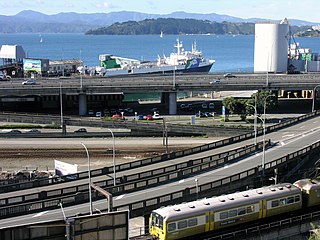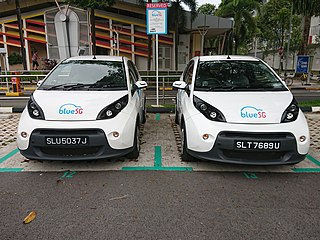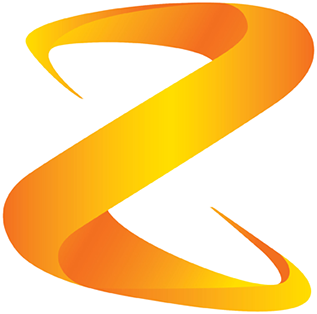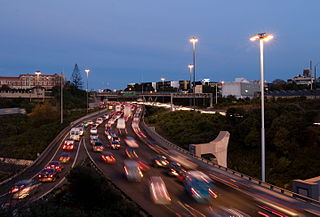
Transport in New Zealand, with its mountainous topography and a relatively small population mostly located near its long coastline, has always faced many challenges. Before Europeans arrived, Māori either walked or used watercraft on rivers or along the coasts. Later on, European shipping and railways revolutionised the way of transporting goods and people, before being themselves overtaken by road and air, which are nowadays the dominant forms of transport. However, bulk freight still continues to be transported by coastal shipping and by rail transport, and there are attempts to (re)introduce public transport as a major transport mode in the larger population centres.

Carsharing or car sharing or car clubs (UK) is a model of car rental where people rent cars for short periods of time, often by the hour. It differs from traditional car rental in that the owners of the cars are often private individuals themselves, and the carsharing facilitator is generally distinct from the car owner. Carsharing is part of a larger trend of shared mobility.

Stuff Ltd is a privately held news media company operating in New Zealand. It operates Stuff, the country's largest news website, and owns nine daily newspapers, including New Zealand's second and third-highest circulation daily newspapers, The Dominion Post and The Press, and the highest circulation weekly, Sunday Star-Times. Magazines published include TV Guide, New Zealand's top-selling weekly magazine. Stuff also owns social media network Neighbourly.
Transport in Auckland, New Zealand's largest city, is defined by factors that include the shape of the Auckland isthmus, the suburban character of much of the urban area, a history of focusing investment on roading projects rather than public transport, and high car-ownership rates.

InterCity is a passenger transport and tourism company in New Zealand. Parent company Entrada Travel Group operates the country's only long distance bus network, and ferries and cruises in the Bay of Islands. Its brands are:

Public transport in Auckland, the largest metropolitan area of New Zealand, consists of three modes: bus, train and ferry. Services are coordinated by Auckland Transport under the AT Metro brand. Britomart Transport Centre is the main transport hub.

The Auckland central business district (CBD), also called the city centre by Auckland Council, is the geographical and economic heart of the Auckland metropolitan area. It is the area in which Auckland was established in 1840, by William Hobson. It is New Zealand's leading financial hub, and the centre of the country's economy; the GDP of the Auckland Region was $122.557 billion in the year ending March 2020.
The Special Tactics Group (STG) is the full-time police tactical unit of the New Zealand Police. The STG, replaced the Anti-Terrorist Squad which was predominantly Military personnel and was established to respond to high-risk situations which are beyond the scope or capacity of everyday policing. STG officers directly support operational police in incidents, such as sieges, with specialist tactical, negotiation, intelligence, and command support services. In 2012, the STG became a police tactical group following the New Zealand government joining Australia’s national counter-terrorism coordination organisation. Officers are assigned to the STG on a full-time basis with sections based in Auckland, Wellington and Christchurch.

The Snapper card is a contactless electronic ticketing card used to pay for bus fares and other everyday items, such as taxis, food and coffee, in New Zealand. It was introduced in Wellington in July 2008. Another version – the Snapper HOP card – was introduced to Auckland in 2011 and withdrawn from Auckland in late 2013. Snapper CityLink cards were introduced in Whangarei in March 2014 and withdrawn in September 2018. It was owned by Snapper Services Limited, a former subsidiary of Infratil until 2019 when it was sold to ICM Limited, a subsidiary of Allectus Capital.
The mass media in New Zealand include television stations, radio stations, newspapers, magazines, and websites. Most outlets are foreign-owned; media conglomerates like NZME, Stuff, MediaWorks, Discovery and Sky dominate the media landscape. Most media organisations operate Auckland-based newsrooms with Parliamentary Press Gallery reporters and international media partners, but most broadcast programmes, music and syndicated columns are imported from the United States and United Kingdom.

Z Energy is a New Zealand fuel distributor with branded service stations. It comprises some of the former assets of Shell New Zealand and Chevron New Zealand. Since mid-August 2013, it has been listed on the NZX with the code ZEL. The largest shareholders were Infratil and the New Zealand Superannuation Fund, each with 20%. It is also listed on the Australian Securities Exchange with the code ZNZ. Shell exited the New Zealand fuel distribution business in April 2010, selling its operations to Infratil and NZ Super. The former Shell operations were rebranded as Z Energy in 2011.

MediaWorks New Zealand is a New Zealand-based radio, outdoor advertising and interactive media company jointly owned by U.S. company Oaktree Capital Management and out-of-home advertising company QMS. It operates nine national radio brands, twelve websites and one locally operated radio station.

The automotive industry in New Zealand supplies a market which has always had one of the world's highest car ownership ratios. The distributors of new cars are essentially the former owners of the assembly businesses. At the dealership level they have maintained their old retail chains in spite of the establishment of the many new independent businesses built since the 1980s by specialists in used imports from Japan. Toyota entered into direct competition with those used-import businesses refurbishing old Toyotas from Japan and selling them through their own dealers as a special line. The nation's car fleet is accordingly somewhat older than in most developed countries.
Community CarShare was a non-profit, carsharing co-op in southern Ontario, that was founded in 1998. It ran into financial trouble and was acquired by Vrtucar on 27 March 2018.
Auckland Light Rail is a proposed light rail line in Auckland, the largest city in New Zealand.

Yourdrive is a New Zealand peer-to-peer carsharing company that no longer runs any business operations. Prior to ceasing operations it facilitated a system in which individuals may rent their privately owned vehicles on an hourly, daily or weekly basis to other registered users of the service. Owners set their rental prices and earn a 60 percent commission from the rental revenue. Prior to going out of business it operated throughout New Zealand with vehicles in Auckland, Hamilton, Palmerston North, Wellington, Christchurch, Queenstown and Dunedin.

JUCY is a tourism company which was founded in New Zealand in 2001. JUCY is primarily a car and campervan hire business and also operates scenic cruises in Milford Sound, and Snoozes in Auckland central, Queenstown, and Christchurch.

Victoria Mary Carter is a former New Zealand politician. She is now a professional company director and businesswoman.

Rotokauri railway station also known as The Hub is a railway station, park and ride, and bus station in north Hamilton, New Zealand serving Rotokauri and Te Rapa. Located on the North Island Main Trunk it was previously a flag station, and was closed in January 1971. It reopened as an integrated transport hub in 2021 as part of Te Huia services between Hamilton and Papakura. Services started on 6 April 2021.
Project NEXT is a proposed public transport payment system for New Zealand. Project NEXT was previously known as the National Ticketing Programme (NTP) from early 2016 to early 2018, preceded by the Auckland Integrated Ticketing Scheme and Auckland Integrated Fares System (AIFS) prior to that. The aim is to achieve a nationally consistent payment system, with a choice of payment by cash, phone, credit card, debit card, or a transit card valid for the whole country. Whilst work at a national level has been undertaken since 2009 and integrated ticketing has been introduced for public transport in Auckland, as of 2020 there is still no national system available. Nine smaller regional councils have meanwhile formed a consortium to introduce a common tag-on-tag-off card branded as "Bee Card" as an interim solution, with rollout of the system from November 2019. Rollout of Project NEXT is expected to start in the Canterbury region in late 2022 and be completely implemented by 2026.














